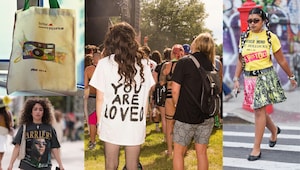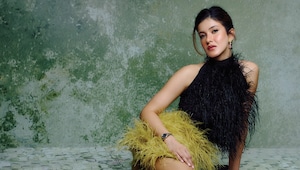
Netflix’s 'Sirens' proves fashion is the best alibi
Sirens turns clothing into a cipher for privilege and deceit, where on Port Haven what’s worn speaks louder than what’s said.

“What is this place, and why does everyone look like an Easter egg?”
In Sirens, Netflix’s limited series, nothing is louder than what’s left unsaid—except, perhaps, the clothes. Set over one decadent weekend on the fictional island of Port Haven, Sirens spirals through betrayal, privilege, and blistering social satire. But its most potent weapon? The wardrobe.
Directed by Stéphanie Di Giusto and starring Julianne Moore as Michaela Kell, Milly Alcock as Simone DeWitt, and Meghann Fahy as Devon DeWitt, Sirens positions fashion not as a backdrop, but as its fourth, most calculating character.
Michaela Kell: The minimalist manifesto

Julianne Moore’s Michaela Kell doesn’t raise her voice, and she doesn’t need to. Her wardrobe does all the heavy lifting. A study in “stealth wealth,” Michaela’s clothing is classic and often appears completely unbranded. Think: The Row, Gabriela Hearst, Loro Piana. No logos, no glitz—just impeccably tailored $2,000 trousers, sharp as her every move.
Her palette is essentially surgical: bone, slate, dove, and taupe. Her silhouettes are precise—cashmere turtlenecks, floor-length column dresses, and the occasional sharply belted trench. These aren’t clothes worn for attention; they’re worn to remind you she doesn’t need it.
Simone DeWitt: From pastels to purpose

As Simone, Milly Alcock begins the weekend dressed like a girl trying to play a woman. At first glance: pastels, pearls, and a wardrobe straight from Port Haven’s country club handbook—Lilly Pulitzer prints, puff sleeves, silk headbands. It’s all very much “baby’s first summer at Martha’s Vineyard.”
But as the series progresses, so does Simone. Her colours get muted. Her dresses lengthen. Gone are the sailor collars; in grounded tones such as cream, navy, and oxblood. It’s the slow unravelling of a facade, stitched into every hem. She’s no longer cosplaying comfort, she’s dressing to survive. Her later looks nod to brands such as Totême and Joseph, with the occasional vintage Ferragamo.
Devon DeWitt: Power in practicality

Meghann Fahy’s Devon DeWitt doesn’t play the Port Haven game, and her wardrobe makes that perfectly clear. She’s the anti-prep. While everyone else dresses like a trust fund, Devon leans into utilitarian style: boxy silhouettes, blunt boots, and an unyielding black-on-black palette. The kind of woman who’d throw on an Acne Studios coat over a plain tee and call it a day.
Her presence is disruptive. While Michaela smothers with minimalism and Simone masks with polish, Devon’s wardrobe is an act of resistance. She wears fatigue green and oil black like a uniform—not to hide, but to announce she doesn’t belong. Not here. Not ever.
In one scene, her oversized Oxford shirt and slouchy trousers (a likely nod to early Céline) become a form of battle gear. It’s fashion stripped of pretence, but never of power.
Fashion as a character study
Costume designer Caroline Duncan turns Sirens into a sharp satire on "old money" through her exaggerated preppy styles, while the gradual shift toward muted minimalism reveals the deeper fractures within each character. Every zippered ankle boot and structured handbag builds a visual narrative of tension, privilege, and female rage.
There’s a moment in Episode 3 when Simone’s bare feet touch the cold stone floor, clashing with her vintage Oscar de la Renta dress. It’s not an oversight, it’s the thesis of Sirens: no one here is fully dressed for who they truly are.
In Sirens, fashion is the story. Through palette, cut, and silhouette, the women of Port Haven communicate power, class, and identity more loudly than words ever could. As alliances fracture and masks begin to slip, it’s the seams in their wardrobes that reveal the deepest truths.
This is fashion as performance. And in Sirens, everyone is dressed to deceive.
Lead image: Netflix
Also read: Hailey Bieber's Rhode is getting acquired by Elf Beauty—here’s the billion-dollar tea
Also read: Here’s what we know about the third season of ‘And Just Like That’
more from Fashion

The rise of ‘I want it all’ culture and why Gen Z means it differently

The rise of Brotox: Memes about male celebs looking *different* are rife - what's really going on?

Can “friendfluence” save dating?

These five chic haircuts make thin hair look thicker and fuller

Shanaya's dark romance

Stop posting about your shitty boyfriend (unless you’re gonna dump him)

15 BDSM movies that aren’t just ‘Fifty Shades of Grey’

NAAR and Quintonil: Bringing a taste of Mexico to the Himalayas

The baker boy hat is officially the accessory to own in 2026

15 FaceTime sex positions to level up your virtual connection
